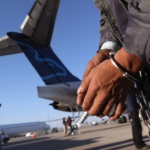
The Minority Spokesperson on Foreign Affairs, Samuel Abdulai Jinapor, has raised alarm over what he describes as a blatant violation of the Constitution by government in its handling of a deportation agreement with the United States.
The Damongo MP said the Minority had noted with grave concern reports that Ghana had accepted 14 deportees from the US, most of whom were Nigerians, with one Gambian included.
He explained that President John Mahama himself confirmed the development at his recent presidential media encounter, saying the government had agreed to receive West African nationals deported from America.
“We were approached by the US to accept third-party nationals who were being removed from the US, and then we agreed with them that West African nationals were acceptable, because all our fellow West Africans don’t need a visa to come to our country,” the President explained.
But the Damongo MP argued that such an arrangement clearly violates Article 75 of the Constitution, which requires that all treaties, agreements, or conventions executed under the authority of the President must be laid before Parliament for ratification.
He pointed to landmark Supreme Court decisions such as Banful v Attorney General and Brogya Gyamfi v Attorney-General, which reaffirmed this constitutional requirement.
“The purported agreement with the United States clearly falls within the scope of Article 75 of our Constitution, as it imposes specific obligations on Ghana regarding such deportees,” Mr. Jinapor stated.
He added that it was surprising that government had proceeded without parliamentary approval despite being aware of the legal precedent.
He recalled the controversy of 2016 when the Mahama administration admitted two Yemeni terror suspects from Guantanamo Bay without parliamentary approval, a move the Supreme Court later ruled unconstitutional.
Mr. Jinapor said beyond the constitutional breach, the agreement also raises sovereignty, security, and foreign policy concerns.
He warned that while Ghana values regional integration, the ECOWAS protocol on free movement covers voluntary travel and not forced deportations arranged by a non-ECOWAS state.
On the diplomatic front, he stressed that Ghana risks damaging its reputation for principled, non-aligned foreign policy by aligning with the United States’ deportation regime, which has been criticised globally as harsh and discriminatory.
“The Ghanaian people deserve transparency and accountability on a matter that so directly implicates our sovereignty, our constitutional order, and our foreign policy,” he insisted.
The Minority is demanding that government disclose when the agreement with the US was reached and whether it was laid before Parliament as required.
They are also calling for the immediate suspension of the deal until Parliament has exercised its constitutional mandate.
“We further urge government to provide full clarity on the processes, safeguards, and broader implications associated with receiving these deportees, including the measures, if any, taken to protect Ghana’s security interests,” Mr. Jinapor said.
He concluded that no future agreements of this nature must be implemented without prior parliamentary ratification, stressing the Minority’s commitment to safeguarding Ghana’s sovereignty and holding government accountable in all foreign policy matters.




